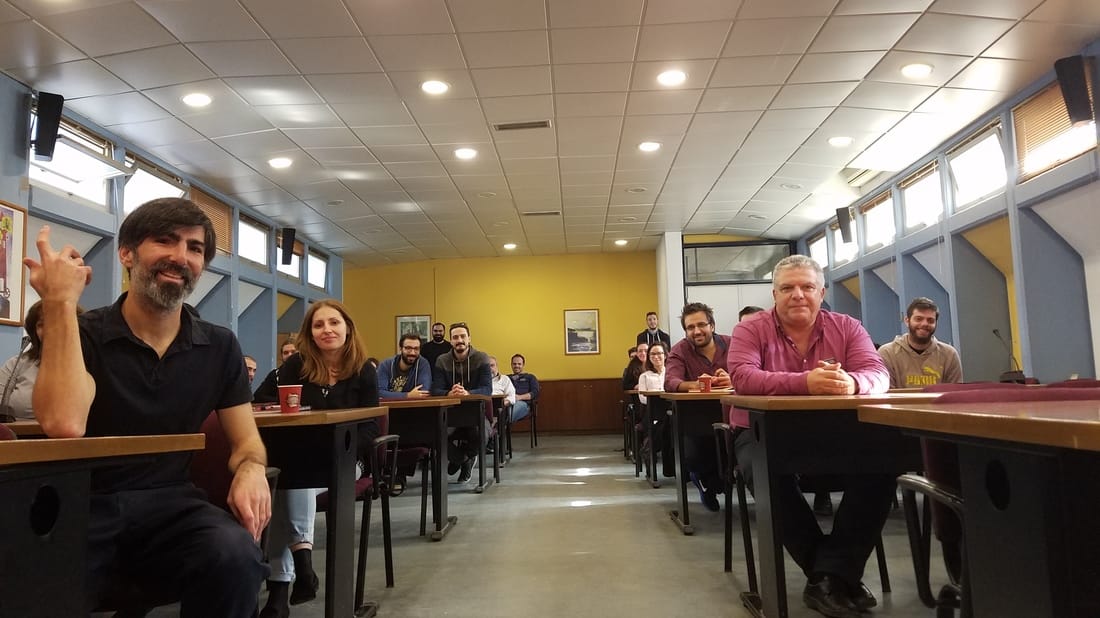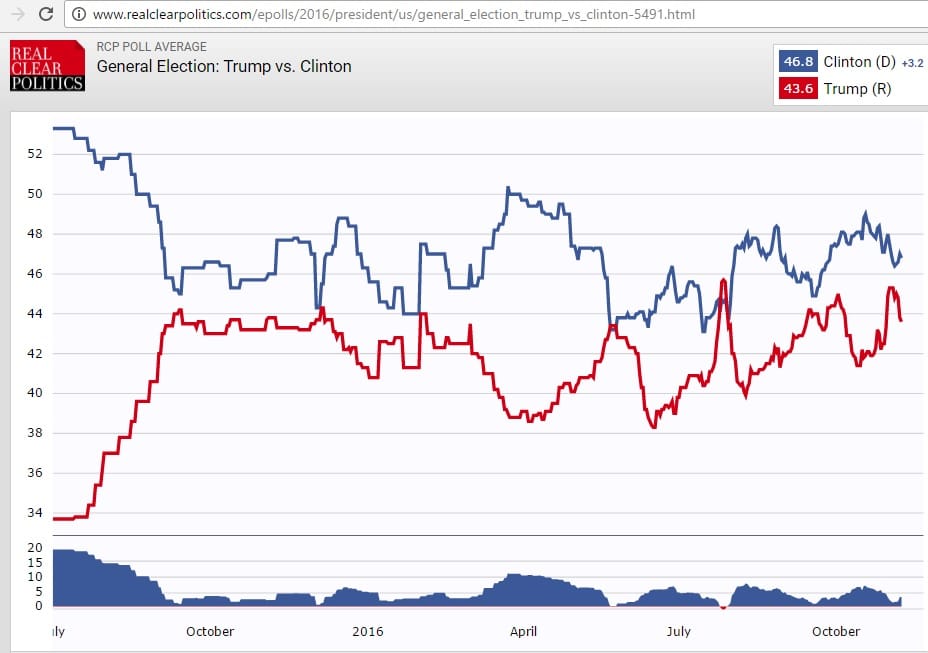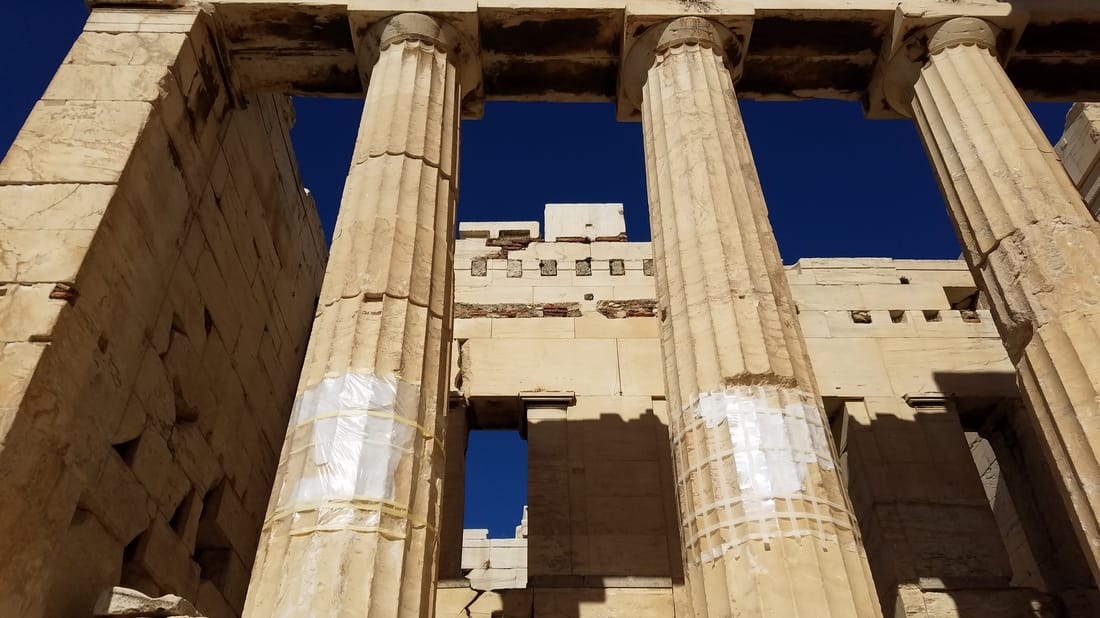|
Before departing for my journey on #ScienceTheEarth, a colleague of mine, Georgios Papacharalampos, suggested that I visit the Bristol Robots Laboratory at the University of West England and the National Technical University of Athens, Greece. These are both universities at which he has previously studied. As you may remember, I visited Bristol in August and you can read about my adventure through the robotic laboratory here. After Vienna, my next stop is in the lab of Gerasimos Lyberatos at the National Technical University of Athens in the School of Chemical Engineering. While in Greece, I also had the opportunity to visit the Parthenon and experience the 56th presidential election of the United States in the birthplace of democracy!
Walking into the university was a bit of a culture shock. Stepping through the main gate, while walking up to the buildings, I notice what appears to be an abundant amount of graffiti. Figuring I’m staring at an art building or a student project I do not think much of it and proceed further into the university. Since I am not quite sure where the School of Chemical Engineering is, I venture onto campus and eventually make my way to the student union to ask for directions. Once I am further into campus, I realize that the graffiti I have been seeing is ubiquitous throughout the campus. While walking to the School of Chemical Engineering with a student, I ask about the graffiti- “This is what happens when you have too much democracy,” he proclaimed. The condition of the school was a reflection of the 2008 Greek riots in which a large student protest occurred as a result of police fatally shooting Alexandros Grigoropoulos- a fifteen year old student. Now, police seldom visit student campuses- the result is that the universities have become a bit of a free for all. Wandering through the halls, I could not help but think that this all seemed a bit unreal- like the conditions of a school that had lost its way in a Hollywood film like High School High or Dangerous Minds.
None of the pictures below have been altered- this is the state of the university.
My seminar in the School of Engineering was well attended. For this lecture, I talked about using microbial electrochemical cell (MXC) technology for practical ‘use-inspired’ research and fundamental research. There is a lot of debate in the field regarding whether or not MXCs can be used or how they should be used for large scale ‘practical’ applications; however, I think this debate often misses one of the greatest points of using MXCs entirely.
You see, despite the fact that MXC technology has not really caught on at an industrial scale, scientists, engineers, and researchers have already been using the technology for over a decade to understand the basic and fundamental physiology of dissimilatory metal reducing bacteria. These bacteria are essential for the homeostasis of Earth as they are involved in many important life cycles including the nitrogen cycle, sulfur cycle, carbon cycle, iron cycle, etc… These bacteria are likely performing some of the earliest forms of respiration on Earth and we can directly measure their respiratory pathways by attaching them to an electrode and monitoring them using a potentiostat! One of the greatest benefits of using MXCs is that they provide a low cost solution to studying the fundamental physiology of any mircoorganism that is capable of interacting with an electrode. From this perspective, MXCs are a very mature and marketable technology that can easily be adapted by microbiologists interested in probing into the biochemistry of these bacteria.
Below are examples from my presentation using real data to show how MXCs can be used to test kinetics, thermodynamics, and bacterial physiology in real time.
In the top left photo (Left to right) Thanassis Goumenos, Giannis Michalopoulos, and Sofia Michalakidi stand next to their Continuous-flow stirred-tank reactor (CSTR). This reactor works by continuously pumping in wastewater using a series of pumps located around the CSTR. Once inside the reactor, the wastewater proceeds through a series channels that enables the wastewater to be maintained at constant conditions throughout its entire volume. This helps optimize nutrient removal and capture. The CSTR is controlled by a large console. The remaining solids from the CSTR are dried and eventually converted into compost. On the top right stands Dimitris Kekkos- behind him is a giant reactor that is used to convert solid waste into ethanol. Below Dimitris stand Danai Alamanou and Konstantina Papadopoulou also next to a giant reactor that is used to convert solid waste into ethanol. The remaining solid waste after ethanol production is used for compost. In the middle on the bottom is George Lytras who is using a bioelectrochemical system to for the bioremediation of hexavalent chromium. In other words, he is using bacteria to remove carcinogens from contaminated water. On the bottom right, similar to Manon Oliot at the Nationale Superieure des Ingenieurs en Arts Chemiqiues et Technologie in Toulouse, France, Mina Tremouli is optimizing MXC design per unit volume by adding additional electrodes to her reactors. Also in the slide show are Giannis Zacharopoulos who is fermenting solid wastes into hydrogen gas and Dimitris Hatziavramidis who purifies medicinal compounds for drug production.
Lamprou George, Anestis Vlysidis, and Apostolos Vlysidis are using wastewater an organic fertilizer to grow olives in none-other than Greece. That’s right, the next time you eat a fine Greek olive oil know that the olive may have been grown on a tree using the waste of the olive oil manufacturing process. Bio Agro Oliva is a fertilizer made from the compost of olive oil production waste. On the roof top of the chemistry building in Athens, Greece, olive trees are currently being grown using the fertilizer to determine its effectiveness. By the way, fertilizer from Bio Agro Oliva is already for sale! In addition, due to the fertilizer’s relatively low nitrogen to carbon ratio, research is ongoing to grow proteinaceous leaves from the compost in order to concentrate the nitrogen into the leaves. The leaves can then be composted to make a high nitrogen to carbon ratio fertilizer. Read more about the specifics of this product here!
Chris Lytras is a wheeler and a dealer. Involved primarily in business- Chris specializes in connecting people with manufacturers and installers for septic systems in rural area via RotoSeptic. See more about RotoSeptic and a video about how septic systems work for wastewater treatment below!
After meeting with Chris, I joined him and some colleagues at a local Greek restaurant which was playing live traditional Greek music.
From the RotoSpetic website:
“In the last decade there have been many changes to the legislation on the management of municipal wastewater and reuse. By monitoring the changes and updates of the Greek and European laws, ROTOSAL designed, researched, and developed a series of compact sewage treatment plants which meet the conditions for all European legislation. In recent years there have been many reports of environmental pollution due to poor or no management of wastewater. We are here help to solve the wastewater problem, which has been growing rapidly in the last decade. Septic systems can be used in homes, cottages, residential complex, restaurants, artisanal food - industry, food and chemical packaging industries etc… The result is sewage treatment and the possibility of either using the reclaimed water for the garden or its safe return to the environment.”
I also had the opportunity to visit the Acropolis which holds the Parthenon, Propylaea, Erechtheion, Odeon of Herodes Atticus, and the Theatre of Dionysus to name a few.
I also got a sudden craving for pizza (see video below) when walking around the gardens at the bottom of the Acropolis.
I also visited the Acropolis Museum which is definitely worth seeing. Inside were a lot of ancient artifacts from ancient Greece covering many centuries. I have added a video about the history of the Acropolis below:
I also went on a walking tour and saw the Changing of the Guard Ceremony at the Hellenic Parliament. I also learned about Priapus and a strange Greek obsession with wooden penises.
USA Presidential Election 2016!!!
On November 9, 2016, at around midnight local time, I went to sleep in Athens, Greece just before the first poll results were announced in the United States. Going to sleep, I expected Hillary Clinton to win given the polling data which I had been checking every other day for the last month. RealClearPolitics.com is a non-partisan website that aggregates the data of multiple polls and gives an overall score for which candidate is ‘ahead’. For most of the election, Clinton was ahead by a few points every time I checked with the exception ofRasmussen Reports which seemed to show that the race was a lot closer than the other polls were suggesting. When I woke up, the winner had still not been declared. It was just before Pennsylvania was finished counting. I looked at the number of voters for which ballots had been counted. Without having the influence of media, looking purely at the numbers, it was clear that the election was won by Donald Trump.
Unlike most of my friends on social media, I was not the least bit surprised. Seeing the results reminded me of an instance that had occurred about a month prior, after the second presidential debate. I was sitting in a hostel somewhere in Europe when someone asked me where I was from. I told him. And then, the all too expected follow up question, “what do you think of Donald Trump?”
What do I think of Donald Trump? The truth is, I often did not ‘think’ of Donald Trump, but rather what he represents. I told him that I thought Donald Trump was not a very ‘presidential’ candidate. But, I told him that Donald Trump is a very talented man and a gifted actor. He told me that Donald Trump was not a ‘real’ actor. My reply was that of course he was- he had already acted himself to become the front runner to one of the most powerful political parties on the Earth. I told him that Donald Trump had clearly won the second presidential debate- you know, the one where he told Hilary he’d “put her in jail.” He told me that I could not say that- that Clinton had “objectively” won the debate and that he hadread about who had won on the internet.
And this is exactly why Trump won and this is exactly why everyone was ‘shocked.’ This person from Australia had absolutely zero grasp on the population of the United States. I am from the United States; I am from the state of Arizona- a traditionally red state. Many members of my family are republican. Many of my friends and colleagues are republican. And I knew that Mr. Trump had told republicans exactly what they wanted to hear. It didn't take a lot of money or political pacs. His rhetoric, his bullying, his impoliteness, and his outrageous incoherent rambling - these are all reasons Donald won. The inability for the Australian to listen to me about how Americans perceived the second debate- this is the reason everyone was ‘shocked.’
Blame fake news or Russian hackers all you want- Donald won because democrats ignored half of the country. Democrats assumed ethical and moral superiority and expected the rest of the country to support them because they were taking the moral high ground. And Donald knew exactly how to pick-up the spirits of the disenchanted- of those who felt unheard. He spun a narrative of politically correct speech vs feelings- he let the people know that rather than concern himself with being politically correct, he was going to concern himself with being empathetic to their feelings. While the democrats were busy telling everyone with a different point of view that they were racist, stupid, and privileged; Donald was telling the American people that he wanted to be ‘their’ voice. Donald Trump said offensive and unforgiveable things, but he did not imply that the American people were stupid.
Donald came across as someone who was angry- someone who was angry for the American people. Angry because politicians are corrupt, untrustworthy, ‘filled with hate.’ And against which candidate better to spin this narrative? Bernie Sanders also knew Clinton’s weaknesses- the same weaknesses she had against Obama- she was a career politician whose name is essentially synonymous with the word ‘scandal.’ Bernie Sanders too came off as very frustrated and passionate about the corruption of Wall Street and politicians. In terms of interacting with the American people, Sanders and Trump essentially ran the same campaign. Against Clinton, Donald won the only presidential race in which he could compete- a reality TV spectacle with alongtime tabloid star- Hilary Clinton.
Rather than hypothesize about what a Bernie v Donald race would have looked like, I am instead going to say bravo to the Republican Party for having the courage to allow Donald Trump to run. During the campaign, many from the GOP did about everything it could to undermine his candidacy. But the American people voted for Donald, and Donald the GOP elected. The same cannot be said for the Democrats. Bernie was gathering donations and support from people all over the USA. Hilary was using her super pacs and political ties to secure votes in the primaries regardless of what the American people wanted. Just as the Republicans wanted Donald to go away, so too did the Democrats want Bernie to go away. But the Republicans had the courage to listen to the American people. The Democrats instead chose to put forth Hilary- apparently with the assumption that she was entitled to the position.
Donald won because he courted elderly white non-college educated voters. This tells us that there is a very large generational gap in the United States. Young people are increasingly college educated and prefer to reside in cities rather than rural areas. In these cities, youth often lack exposure to people without their point view point. Most of us who are young and college educated communicate via social media or other electronic means- the elderly do not. This means that as a young adult in the United States, to enact real political change, you cannot be complacent sitting on a chair in front of a computer screen. You need to leave your house and communicate with people on the streets and in your neighborhoods. Heck- visit your grandma and thank her for being there your whole life- let her know young people are sane and loving and haven’t lost their ability to give someone a hug.
The most nefarious aspect of a democratic republic is lulling the public into believing that they are no more than a vote. You are more than a vote! For those of you that did vote for Donald, and for those of you who did not, it is increasingly important that we realize that we must take actions if our political will is to materialize. Given that the USA is one of the worst rated western democracies in terms of electoral integrity and that unless you are an economic elite or a highly funded interest group there is no significant correlation between how you vote and which policies are actually enacted in the USA- we are required to venture into the world and transform it ourselves. Even Donald has alreadyturned his back on almost every political promise he made. We cannot afford to insist that sitting at our computer or merely showing up on Election Day is going to give ourselves a voice.
The aspect of this election which is of paramount importance is that Donald opened a lot of wounds within the USA. Donald triumphantly exposed a naive US population to the ideologies and beliefs that prevail in this country despite their ridicule from popular culture. Now that these wounds are open, we have the opportunity to mend them- to listen to each other and understand the how and why we feel certain ways. Rather than let this election slip away, rather than allow ourselves to return to oblivious consumer culture, we must insist that we continue a dialogue and find common ground.
If you want to see positive social change- you must be that positive social actor. Solving the Earth’s issues and inventing its solutions does not start at the next election cycle- it starts right now. It starts with a heart, it starts with a hug, and it starts with a willingness to listen.
0 Comments
Leave a Reply. |
Science /ˈsīəns/
|




 RSS Feed
RSS Feed